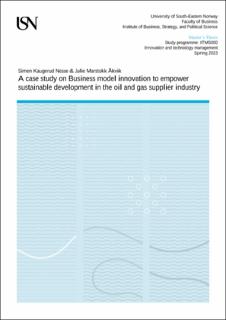| dc.description.abstract | This dissertation`s overreaching objective is to investigate the in-depth sustainable growth of the oil and gas supplier industry by analyzing business model innovation from a perspective of empowerment. The research contains a theoretical model that comprises Business Model Frameworks, Sustainable Business Models, Corporate Social Responsibility, and The Triple layered Business Model Canvas.
The Norwegian oil and gas industry is expected to progressively adopt a more sustainable approach and minimize its carbon footprint. The ability and effectively adopt new business models is an essential factor, that provides organizations with a sustainable competitive advantage. Business models serves as a vital tool for improving the sustainability performance of these organizations. Therefore, we investigate a Norwegian firm whose primary business areas include subsea, surface, new energy ventures, technology and innovation, and digital transformation.
We conducted a qualitative single-case study based on in-depth interviews to answer the research question. In addition, seven open-ended interviews were conducted with various middle-and high level managers and a focus group. Triangulation and trustworthiness were employed to enhance the data's credibility and confirmability.
An inductive data investigation performed the analysis of the data was performed with a two-cycle coding. Our findings indicate that the company prioritizes integrating sustainability into its core operations to enhance its competitiveness and the ESG framework. In their honest view, they can always do better and develop. The organization constantly considers how to use business model innovation to create, capture, and deliver value to the industry. Significant factors include cost structure, value proposition, essential partners, and key activities. Sustainable business model innovation is achieved alone and in collaboration with partners. The employed business model innovation used is servitization and offline to online.
Keywords: Innovation, Sustainability, Business Model Innovation, ESG, Oil and gas industry, Qualitative research study, Norway, Supplier | en_US |
